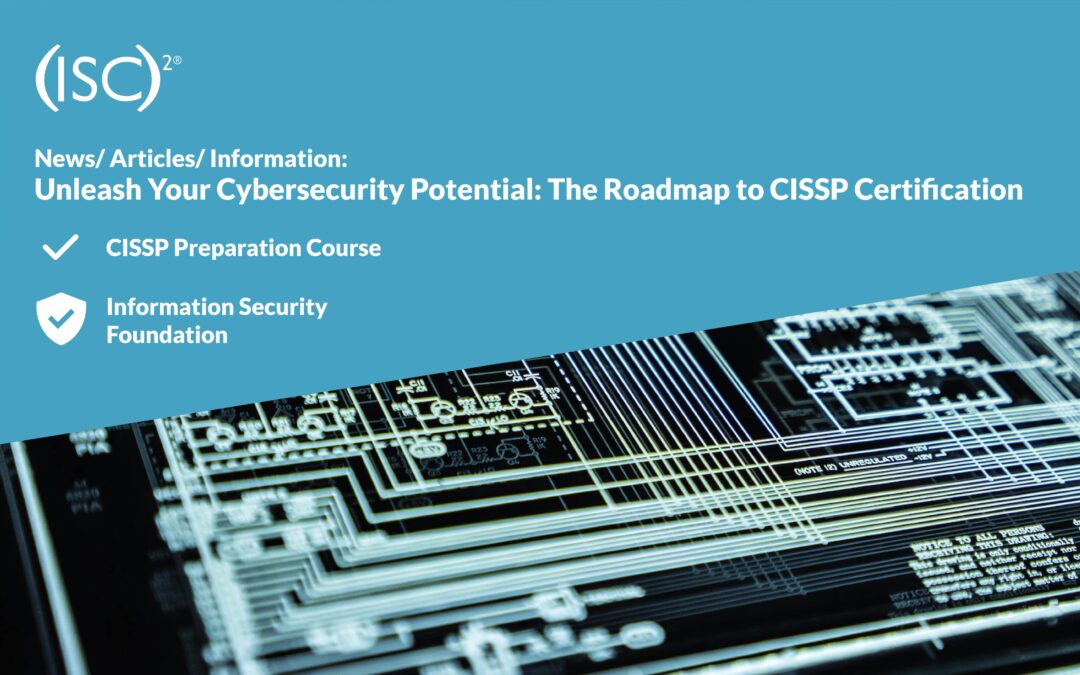What does CISSP mean?
Securing information systems is a top concern and a major challenge for organisations in every industry. As our dependence on technology increases and cyber threats evolve, there is an ever-growing need for competent security leaders with proven expertise in designing, implementing and managing successful cyber security programs.
The Certified Information Systems Security Professional (CISSP) credential is one of the most prestigious and sought-after qualifications that validate IT and information security professionals’ security management expertise and commitment to professional excellence. CISSP-certified professionals are highly coveted by employers and respected by peers on a global scale. According to a recent (ISC)²) survey, CISSP-certified security professionals earn 25% more than their non-certified peers.
The CISSP certification proves security professionals’ skills and experience in eight domains of IT security management: Security and Risk Management, Asset Security, Security Architecture and Engineering, Communication and Network Security, Identity and Access Management (IAM), Security Assessment and Testing, Security Operations and Software Development Security.
IT and information security professionals looking to advance their career to a management position should consider earning the CISSP certificate, because the CISSP credential is commonly considered proof of the in-depth security expertise and the leadership, communication and problem-solving skills needed for senior IT security management roles.
Read on to find out how CISSP can benefit your career, how you should prepare for the adaptive CISSP certification exam, and what other requirements you should meet to successfully achieve CISSP certification.
Why should you become a CISSP?
The Certified Information Systems Security Professional (CISSP) certification is regarded as the industry’s gold standard and is used as a measure of excellence across the globe. CISSP certifications attest to security professionals’ IT security expertise, management skills and dedication to professional growth, which results in CISSP frequently being required for senior cyber security positions. IT security professionals who intend to pursue a cyber security leadership role often find that CISSP increases their earning potential and provides paths for promotion and more fulfilling career opportunities.
CISSP validates IT security skills and experience
On the one hand, the CISSP designation exhibits in-depth knowledge and experience in all key domains of IT security: Security and Risk Management, Asset Security, Security Architecture and Engineering, Communication and Network Security, Identity and Access Management (IAM), Security Assessment and Testing, Security Operations and Software Development Security. CISSP is powerful proof of a security professional’s ability to build secure IT systems and protect data from online threats.
CISSP validates leadership and management skills
On the other hand, a CISSP credential demonstrates possession of the soft skills necessary for effective security governance and risk management. By earning a CISSP certificate, security professionals validate their leadership skills and their ability to successfully manage security teams, interact productively with stakeholders, and address challenging security issues – the most important qualities employers look for in security leaders.
CISSP validates commitment to professional excellence
CISSP-certified professionals are recognised by employers and peers as IT security management experts committed to professional excellence and development. CISSP holders have to meet continuous professional education requirements to keep their certification active. An active CISSP credential demonstrates security professionals’ effort to keep up with industry standards and best practices, a critical component of their ability to protect their organisation in a world of evolving threats and attacks.
Are you considering CISSP to advance your career in IT security management? Security Academy Online offers online instructor-led CISSP Preparation Courses with trainers who are active in the CISSP domains and can help you prepare for your CISSP exam with practical tips and strategies.
Why should you consider CISSP certification for your team?
CISSP-certified professionals are valuable assets to organisations because they can develop, implement and manage effective enterprise security programs. Hiring CISSP-certified professionals helps organisations ensure that their IT systems are well-protected against cyber threats and adhere to relevant industry security standards.
With a proven ability to design, implement and manage effective cyber security programs that keep pace with technological advances and changing threats, CISSP holders enhance their organisation’s reputation, boost consumer trust and improve the organisation’s performance by reducing costs relating to data breaches and other security incidents.
Today, organisations are facing great challenges due to a global cyber security skills and leadership shortage. Recognising the risks of not being able to stay ahead of threats and attacks, many organisations choose to train and retain their security staff with valuable certifications.
Are you considering training your team for CISSP? Security Academy Online offers online instructor-led in-company CISSP Preparation Courses with an intensive pace and a practical focus.
How to become a CISSP?
To become a CISSP, the first step is to pass the (ISC)2 CISSP certification exam. In addition, CISSP certification requires a minimum of five years of cumulative, paid, full-time professional work experience in at least two of the eight domains of the (ISC)2 CISSP Common Body of Knowledge (CBK). The required experience is reduced to four years if the candidate has earned a four-year college degree, its regional equivalent, or an additional credential from the (ISC)2 approved list.
CISSP candidates without the required experience may sit the CISSP exam. Upon passing the CISSP examination, they can become an Associate of (ISC)2 and earn the five years of required experience in six years following their admission.
The CISSP exam is in English, lasts 4 hours and consists of 125 to 175 open and multiple-choice questions. The CISSP exam is a CAT (Computerised Adaptive Testing) exam. This means the algorithm adapts the difficulty of questions presented depending on the candidate’s responses to previous questions.
The CISSP exam is quite a challenge and should not be underestimated. Even the most experienced candidates are advised to devote considerable study time to make sure they have a full understanding of all CISSP knowledge domains. The Security Academy’s expert CISSP trainers recommend at least 40 hours of self-study in addition to training and completing at least one practice exam.
What are the CISSP exam domains?
The CISSP exam covers the eight key domains of IT security management. If you have in-depth knowledge and experience in these domains, you may be only two steps away from passing the CISSP exam and earning the CISSP certificate. If you want to make absolutely sure you master all domains, take a self-paced online training to practise with case studies and mock exam questions.
Module 1 – Security and Risk Management: Policies, methods, concepts, structures and standards that enable effective and efficient security governance and risk management. Security management soft skills including leadership, organisational structures, behaviour and security awareness.
Module 2 – Asset Security: Securing and monitoring company assets and data to ensure an appropriate level of confidentiality, integrity and availability.
Module 3 – Security Architecture and Engineering: Design and implement secure applications, operating systems, equipment and networks.
Module 4 – Communication and Network Security: Network architectures, communication and transmission methods, protocols and measures to guarantee security.
Module 5 – Identity and Access Management (IAM): Physical and logical access control methods and identity management.
Module 6 – Security Assessment and Testing: Detect vulnerabilities in IT systems and determine the risks they may pose using industry-approved security testing and evaluation methods and techniques.
Module 7 – Security Operations: Security measures enforced in the organisation’s day-to-day operations and control of information assets in centralised and distributed environments.
Module 8 – Software Development Security: Security in software environment, software protection mechanisms, software security assessments, secure coding guidelines and standards.
Have you explored the possibility of providing your team with an accelerated CISSP training? Security Academy Online provides comprehensive CISSP preparation courses tailored to your company’s needs. Security Academy CISSP courses are taught online by practicing IT security experts with extensive experience in the CISSP domains, and prioritise practical, experience-based learning to ensure maximum effectiveness.

